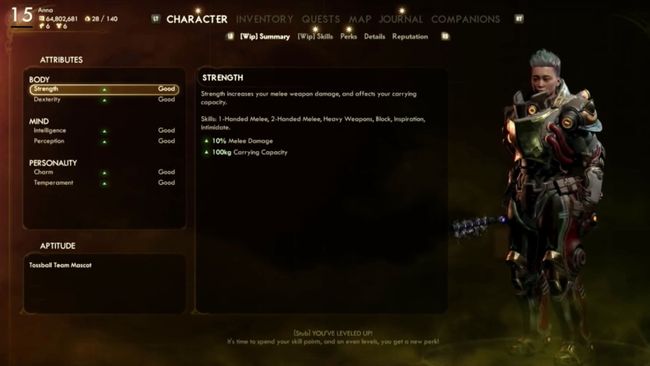Sailor Woedica
Cipher

- Joined
- Oct 8, 2018
- Messages
- 1,121
I don't think this was posted so totally sorry if it was already
 :
:
https://www.gamespot.com/articles/the-outer-worlds-story-is-defined-by-choice-you-ca/1100-6467960/
Megan reveals so much cool info about the game that I haven't seen anywhere else!!!

https://www.gamespot.com/articles/the-outer-worlds-story-is-defined-by-choice-you-ca/1100-6467960/
Megan reveals so much cool info about the game that I haven't seen anywhere else!!!
The Outer Worlds' Story Is Defined By Choice; You Can Even Be The Game's Villain
Your journey in Obsidian Entertainment's The Outer Worldsis defined by choice, with your decisions extending beyond a morality system that defines the type of hero you want to be. If you so choose, you can join up with the antagonists of The Outer Worlds and become the villain of the story.
The Outer Worlds is set in a solar system that's been colonized by corporations led by a group referred to as the Board. You play as someone who was supposed to be one of the first colonists, but your ship is mysteriously lost along the way. 70 years later, someone finally finds you and wakes you up.
"The scientist Phineas Wells finds you," Obsidian Entertainment senior narrative designer Megan Starks said in an interview with GameSpot. "He wakes you up. The Board is trying to stop him because he wants you to help save the system. You can either decide to go with his plan and help him out or you can join the Board and go forward with their agenda. Or you can try and double cross both of them, and be a lone wolf."
"You [can actually] end up being the antagonist of the game, based on your choices," she continued. And though Starks wasn't able to provide specifics (as doing so would obviously spoil the game), she did say that choosing to be The Outer Worlds' villain "definitely" has drastic changes to the overall outcome of the story.
This style of storytelling isn't exactly new for Obsidian, as the developer crafted four unique endings to Fallout: New Vegas--all of which are dependent on which faction or individual you ultimately side with by the game's end. That said, the choices you make in The Outer Worlds can have very noticeable impacts on the story prior to reaching the end of the narrative. Not every choice is clearly laid out as a dialogue option either. Every cause, ranging from how you decide to complete a mission to choosing your clothes, can have some sort of effect.
"[Characters] will comment if you run around naked," Starks said, laughing. "A lot of [the story] is based on the actions you take in the game. If you kill someone that [another character] cares about, they're definitely going to be very opinionated. Felix is kind of this happy-go-lucky, violent anarchist, so he doesn't like it if you're siding with the Board and doing their propaganda stuff." How you present yourself can influence others' perception of you and, in turn, change what options you have with the said character going forward. Approaching a peaceful town with all your guns out isn't the best first impression, for example. "They'll ask you to put your gun away if you're in town," Starks said. "They'll say, 'Whoa! Watch where you're pointing that thing!'" Though it doesn't have as major an impact on questlines and the overall story, characters will react to whether you're a man or woman as well.
Managing how others perceive you is important because you can lose out on certain quests and storylines if you drive your companions or other important NPCs away. "The companions are like real people," Starks said. "They have opinions on things. Companions have their own quests and you can decide which way you want to push them during the quest, but you can also fail the quest based on those decisions."
Losing a companion, whether they just leave your squad or outright die via permadeath in the challenging Supernova Mode, is a loss in terms of both story and combat. Your allies aid you in battle, and their personalities provide help during conversations. Similarly to Mass Effect and Dragon Age, companions will interject their opinion into certain conversations during the main campaign. Building a bond with someone allows you to turn to them during difficult dialogue checks to provide their expertise and help you handle problems in unique ways. So choosing who you travel with on a mission extends beyond which weapons and perks they have. You (unfortunately) don't have the option to cement your connection with someone with romance, but traveling with specific companions and befriending them does allow you to get to know them better.
In The Outer Worlds, your decisions and mistakes can cause your character to develop a Flaw. As the name implies, it nerfs your character in some way. However, each Flaw also provides a helpful perk. For example, if you die to a bunch of robot enemies in a short amount of time, you may unlock the Flaw Robophobia. If you choose to accept it, you'll struggle against robotic enemies but gain something helpful in return.
"The fear ones are pretty common," Starks said, adding that there are "a few different types." There are even ones that can account for any mistakes you might make in the character creator. "On one of my recent playtests, I wanted to make a Dumb character so I could see the Dumb dialogue options as I was going through the different areas of the game, but I forgot to lower my Intelligence in the character creator," Starks said. "But then I actually took enough damage [to the head] that I was offered the Permanent Concussion Flaw, which lowers your Intelligence but also gives you the Dumb tag. So it totally worked out!"
In this example, Starks explained she was then able to make stupid remarks during conversations--opening up a whole new tree of dialogue options--but her lower Intelligence prevented her from using science weapons. In another example, developing a fear of the dark provided a welcome perk but at the cost of losing out on sneaking into an enemy stronghold via the unlit back alley. You need to think ahead when it comes to Flaws, as something that doesn't seem very important early in the game can have consequences hours later. "You don't have to take a Flaw unless you're playing the hardest difficulty, which is Supernova Mode," Starks said. "But if you choose to take a Flaw, it is with you for the rest of the game."
The Outer Worlds is scheduled to launch on October 25 for Xbox One, PS4, and PC. On PC, The Outer Worlds is a limited-time Epic Games Store exclusive, launching on that storefront first before releasing on Steam a year later. The Outer Worlds was one of our favorite games of E3 2019.













 "
"
































